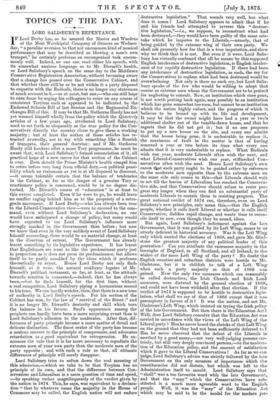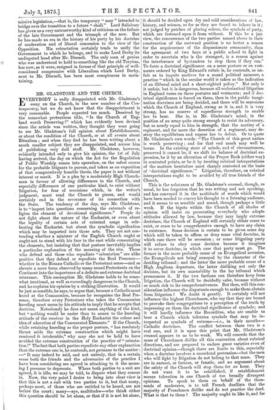TOPICS OF THE DAY.
LORD SALISBURY'S REPENTANCE.
IF Lord Derby has, as he assured the Master and Wardens of the Most Worshipful Company of Grocers on Wednes- day, "a peculiar aversion to that not uncommon kind of musical performance that may be described as blowing a man's own trumpet," he certainly performs an uncongeniaal task uncom- monly well. Indeed, no one can read either his speech, with its somewhat anxious language as to Mr. Disraeli's health, or Lord Salisbury's speech on the same day to the Middlesex Conservative Registration Association, without becoming aware that a change has passed over the Conservative Cabinet, and that whether there still be or be not within it a party disposed to coquette with the Radicals, there is no longer any statesman of much account in it,—or at most, but one,—who can still hope to earn fame by urging his colleagues to enter on any course of consistent Toryism such as appeared to be indicated by the Endowed Schools Bill of last Session and the Regimental Ex- changes Bill of this. It may be that Mr. Gathorne Hardy has not yet weaned himself wholly from the policy which the Quarterly articles of a few years ago, attributed to Lord Salisbury, used to set forth so eloquently as the true policy for the Con- servatives directly the country chose to give them a working majority ; but at least the author of those articles has re- tracted avowedly, not to say with something like a flourish of trumpets, their general doctrine ; and if Mr. Gathorne Hardy still hankers after a more Tory programme, he must be aware that, with Lord Salisbury's formal renunciation of it, all practical hope of a new career for that section of the Cabinet is over. Even should the Prime Minister's health compel him to retire before very long from official duty,—a political possi- bility which no statesman as yet is at all disposed to discount, —it seems tolerably certain that the balance of tendencies in the Cabinet, so far as the danger of a genuine Tory or reactionary policy is concerned, would be in no degree dis- turbed. Mr. Disraeli's course of "education" is at least to this extent completed. Even if he were to go, he would leave no conflict raging behind him as to the propriety of a retro- grade movement. If Lord Derby—who has always been true -to the Liberal-Conservative view—were to succeed to the com- mand, even without Lord Salisbury's declaration, no one would have anticipated a change of policy, but many would have expected to see Lord Salisbury's influence more strongly marked in the Government than before ; but now we know that even in the very unlikely event of Lord Salisbury himself succeeding, there would be no material change, at least in the direction of retreat. The Government has already learnt something by its legislative experience. It has learnt that Englishmen are wont to like the predominant party just in proportion as it does not press its predominance, but allows itself to be partly moulded by the ideas which it professes theoretically to reject. Hence Lord Derby not only finds himself, as it were, the natural residuary legatee of Mr. Disraeli's political testament, so far, at least, as the attitude towards reaction is concerned,—indeed, that he has always been,—but he finds himself, for the first time, without a real competitor, Lord Salisbury piping a harmonious second to his tune. We can hardly wonder, then, that there is a new tone of authority in Lord Derby's speech. For his section of the Cabinet has won, by the law of "survival of the fittest ;" and it is no longer Mr. Disraeli's dexterity and skill which turn the balance in his favour. Saul's appearance among the prophets can hardly have been a more surprising event than is Lord Salisbury's adhesion to the moderates. After that, dif- ferences of party principle became a mere matter of detail and delicate distinction. The finest orator of the party has become a zealous convert to the principle of compromise, and advocates retardation as a good equivalent for retrogression. He an- nounces the rule that it is far more necessary to repudiate the extreme men of your own party than the moderate men of the party opposite ; and with such a rule as that, all ultimate differences of principle will surely disappear.
Lord Salisbury tries to soften down the real meaning of this admission,—which we take to be that Toryism has no principle of its own, and that the difference between Con- servatism and Liberalism is a mere question of time and speed, —by speaking rather magniloquently of the verdict given by the nation in 1874. This, he says, was equivalent to a declara- tion "that by whatever name the majority in the House of Commons may be called, the English nation will not endure
destructive legislation." That sounds very well, but what does it mean ? Lord Salisbury appears to admit that if he and his friends had attempted to reverse this "destruc- tive legislation,"—i.e., we suppose, to reconstruct what ha& been destroyed,—they would have been guilty of the same mis- take which he imputes to the Liberals,—namely, that of being guided by the extreme wing of their own party. We shall ask presently how far that is a true imputation, and show why we think that it is not. But even if it were, Lord Salis- bury has virtually confessed that all he means by this suppose& English intolerance of destructive legislation, is English intoler- ance of too rapidly destructive legislation. If there had been any intolerance of destructive legislation, as such, the cry for the Conservatives to replace what had been destroyed would be overwhelming. Not only is there no such cry, but Lord Salis- bury speaks of the few who would be willing to adopt that course as extreme men whom the Government are to be praised for neglecting to consult. Now, an institution which once gone, is not worth putting back again, may possibly be an institution. which has gone somewhat too soon, but cannot be an institution which the nation highly values, and the progress of which it believes to be bound up with its life and development Itmay be that the owner might have had a year or two's. additional shelter out of the tumble-down house, and that he regrets that he did not get it ; but if no one proposes to put up a new house on the site, and every one admits:, that the house being gone, it is undesirable to replace it the maximum of fault in the matter is that of having removed a year or two before its time what every one admits that it is very undesirable to replace. What Radicals wish one year, moderate Liberals often wish the next, and' what Liberal-Conservatives wish one year, stiffnecked Con- servatives often wish the next. Hence Lord Salisbury's own canon that each party ought to be guided rather by reference to the moderate men opposite than by the extreme men on the same side only comes to this—that Liberals should wait to act till the leaven of Liberalism has reached the Conserva- tive side, and that Conservatives should refuse to resist pro- gress any longer when they can find no substantial party of moderate Liberals to sustain them in resisting progress. The great national verdict of 1874 can, therefore, even on Lord! Salisbury's new principles, only mean this,—that the English people, whether it calls itself Liberal or whether it calls itself Conservative, dislikes rapid change, and wants time to recon- cile itself to new, even though they be sound, ideas.
But again, Lord Salisbury's indictment against the late Government, that it was guided by its Left Wing, seems to us utterly deficient in historical accuracy. Was it the Left Wing only which carried the elections of 1868, and gave Mr. Glad- stone the greatest majority of any political leader of this generation ? Can you attribute the enormous majority in the boroughs of England, in all Scotland, and all Ireland, to the wishes of the mere Left Wing of the party ? No doubt the English counties and suburban districts were hostile to Mr. Gladstone, but it is childish to talk of a Left Wing when such a party majority as that of 1868 was: gained. Now the only two measures which can reasonably. be called destructive, the Irish Church and Irish Lan& measures, were dictated by the general election of 1868, and could not have been withheld after that election. If the verdict of 1874 is supposed to be hostile to destructive legis- lation, what shall we say of that of 1868 except that it was peremptory in favour of it ? It was the nation, and not Mr. Gladstone's Left Wing, which insisted on trying the Irish policy of the late Government. But then there is the Education Act t Well, does Lord Salisbury conceive that the Education Act was, carried in accordance with the views of the Left Wing of the Liberal party? Has he never heard the shrieks of that Left Wing, on the ground that they had not been sufficiently deferred to ? Has he never observed that the defeat of the Liberals is- ascribed by a good many,—not very well-judging persons cer- tainly, but still very deeply convinced persons,—to the modera- tion of the Education policy, and the amount of satisfaction which it gave to the Liberal Conservatives ? As far as we can judge, Lord Salisbury's advice was strictly followed by the late Government on the only measure of importance which the constituencies did not dictate, but which was left to the Administration itself to mould. Lord Salisbury says that "shall" was a too favourite word with the late Government, and that the "may" which the Conservatives have sub- stituted is a much more agreeable word to the English people. Well, it was the "may" of the Education Act which may be said to be the model for the modern per-
bridge over the transition to a future" shall." Lord Salisbury has given us a very untrustworthy kind of criticism on the failure of the late Government and the triumph of the new. But he has made an era in the history of his party by his doctrine of moderation and of liberal concession to the view of the Opposition. His retractation certainly tends to unify the Government to which he belongs, and to make Lord Derby its undisputed head after Mr. Disraeli. The only man of genius who was understood to hold to something like the old Toryism, has now, as it were, resigned in favour of that principle of well- considered compromise with Liberalism which Lord Derby, next to Mr. Disraeli, has been most conspicuous in main- taining.



































 Previous page
Previous page